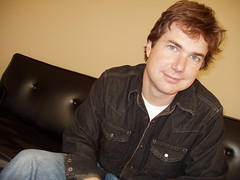
I'm biting off more than I can chew with this post, since it's about time for bed, on a Saturday night no less, and Jansenism has a complex history that I'm just getting my head around. Let's suffice it to say that in the mid-1600's a Roman Catholic movement developed based on the ideas of a Dutch bishop named Cornelius Jansen (1585-1638). After reading a ton of St. Augustine, Jansen came to believe that the Roman Catholic Church, and espeicially the Jesuits who were so active in his own day, had departed from the radical nature of grace and sin for which Augustine had argued against Pelagius. By ditching Augustine and instead following the ideas of Molina, the Jesuits had functionally become semi-Pelagian: fallen humanity was only sick in sin, not dead, and that by cooperating with a dose of God's grace, we can cooperate in our eventual acceptance by God. Jansen's seminal work, the Augustinus rapidly spread through Holland,Belgium, and France, and was actually endorsed by ten professors at the Sorbonne in Paris, the old bastion of Catholic orthodoxy. The party didn't last long. Pope Innocent X, after thirty-six long discussions with advocates and detractors, over two years, finally condemned five representative statemements from the Augustinus in 1653. But here's my point: look at the five condemned statements and notice how close they were to the Reformed views on the same topics. Here are the five condemned statements as they appear in the somewhat clunky wording of the old Catholic Encylcopedia (newadvent.org). Following that are my five, easier-to-read versions of the same points:
1. Some of God's commandments are impossible to just men who wish and strive (to keep them) considermg the powers they actually have, the grace by which these precepts may become possible is also wanting;
2. In the state of fallen nature no one ever resists interior grace;
3. To merit, or demerit, in the state of fallen nature we must be free from all external constraint, but not from interior necessity,
4. The Semipelagians admitted the necessity of interior preventing grace for all acts, even for the beginning of faith; but they fell into heresy in pretending that this grace is such that man may either follow or resist it;
5. To say that Christ died or shed His blood for all men, is Semipelagianism.
Now, to put this in updated and slightly expanded language:
1. No one can follow all of God's laws, no matter how hard they strive, for no one now has the moral power to do so. God does not even grant this power to everyone.
2. An unregenerate person can only be saved by an irresistible act of God's grace.
3. The idea of an unregenerate person eventually "choosing" God is not a contradiction of God's irresistible grace that ennables such a choice. This irresistible grace does not externally constrain the will, but ennables it, from the inside, to really be free.
4. Semipelagians admitted that ennabling grace was necessary, but fell into heresy when they said such grace must be cooperated with by a non-ennabled choice of the free will.
5. To say that Christ atoned for all people's sins is Semipelagian, because, since all people are not finally saved by God, then they must have resisted what is merely an open offer of his grace.
If this reminds anyone of the classically Protestant Canons of Dort, also completed in Holland a few decades earlier, you couldn't be blamed! To me, this is an amazing example of how some within the Roman Catholic Church were able to advocate for, at least for a few years, a return to Augustinian (dare I say, Pauline!) views about sin and grace, and with several highly-situated advocates. To bad Jansen's views were outlawed-- they probably wouldn't have been as controversial three-hundred years earlier, but the Reformatin/Counter-Reformation lines were drawn pretty firmly by the 1650's.

No comments:
Post a Comment